The FCU_FanControl is a component to control the fan. The component has been created for 1-, 2-, or 3-speed fans, and for fans with analog inputs (the type of the fan can be selected by the user). The fan algorithm can be split into two modes:
-
Standard: the demand for the fan is active, and the fan speed is calculated based on the temperature value. The standard mode conditions:the FanDemand slot is false;the Antifrost slot is false;the HeatingOccupiedActive slot is false;the CoolingOccupiedActive islot s false;the TestMode slot is 0.
-
Non-standard: the additional parameters override the fan speed. The non-standard mode must comprise at least one of the slots: FanDemand, Antifrost, HeatingOccupiedActive, CoolingOccupiedActive, is true, or the Test Mode is higher than 0.
In the standard mode, the fan is switched on when the internal variable, the Fan Control Value (calculated on the basis of the CV and Setpoint slots), is higher than the Fan Speed 1 Threshold, and switched off when the Fan Control Value is lower than the Fan Off Threshold.
The non-standard operation is defined by the slots states combinations and is described below.
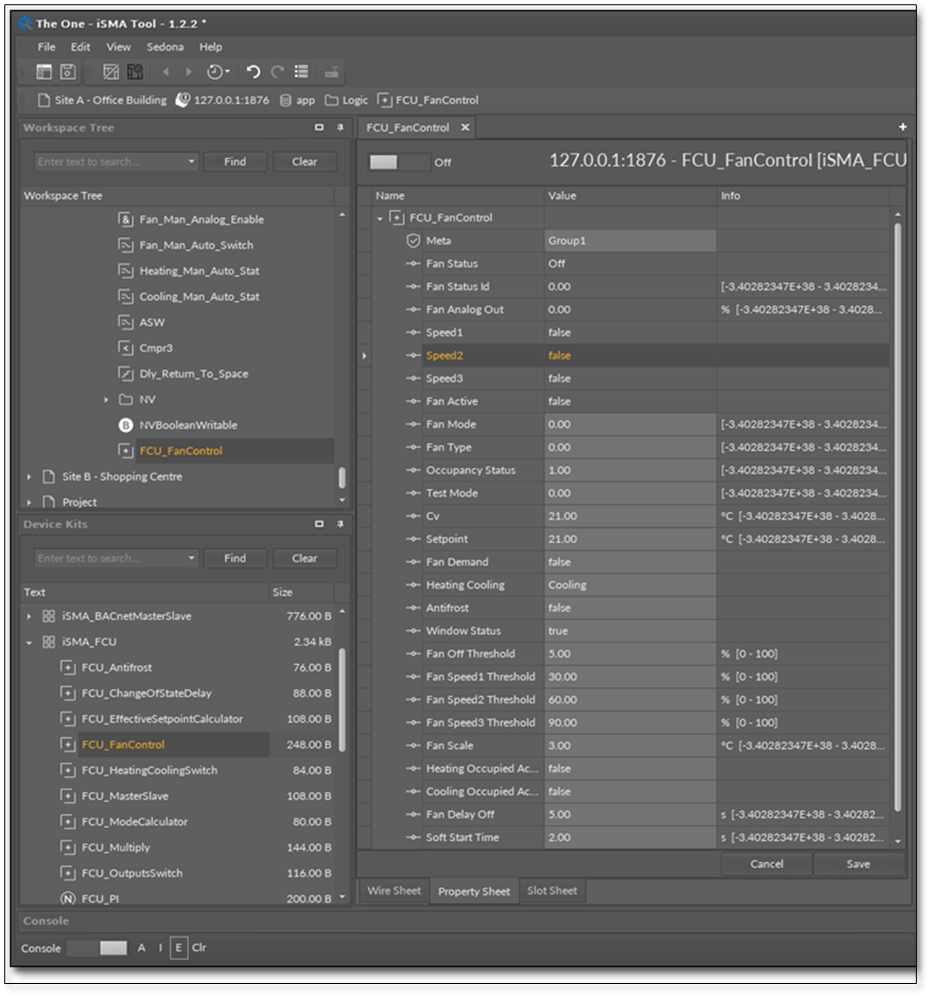
The FCU_FanControl component
The FCU_FanControl component has the following slots:
-
Fan Status: indicates the current status of the fan;Available information: Off (0), Speed 1 manual (1), Speed 2 manual (2), Speed 3 manual (3), Speed 1 auto (4), Speed 2 auto (5), Speed 3 auto (6);
-
Fan Status Id: shows the numeric value corresponding to the Fan Status slot;
-
Fan Analog Out: the component's output for the fan with analog input, expressed as percentage; for fans with discrete inputs (the Fan Type slot is set to 1, 2 or 3), the value of the Fan Analog out is equal to 0%;
-
Speed 1, Speed 2, Speed 3: the component's outputs for fans with binary inputs; for fans with analog inputs (the Fan Type slot is set to 0), states of the Speed 1, Speed 2, and Speed 3 slots are set to false, and cannot be changed by the algorithm of the component;
Note: The FanControl component has a built-in protection against enabling several speeds at the same time, which could cause physical damage to the fan. If the current fan speed has to be changed to another one, all binary outputs responsible for fan speeds are disabled for 1 second, and only then the new speed is enabled.
-
Fan Active: allows to confirm the operation of the fan;
Note: If the value of the Fan Status ID slot is higher than 0, the Fan Active slot is set to true. In other cases, the state of the Fan Active slot is set to false.
-
Fan Mode: the main input of the component;Available settings: Off (0), Speed 1 manual (1), Speed 2 manual (2), Speed 3 manual (3), Auto (4);
Fan Modes:
-
(0) Off: the fan is disabled.
-
(1) Speed1(Manual): the fan works with speed 1, regardless of temperature values. If the Fan Type slot is set to 0 (fan with analog input), the value of the Fan Analog Out is set to the value from the Fan Speed 1 Threshold slot.
-
(2) Speed2(Manual): the fan works with speed 2, regardless of temperature values. If the Fan Type slot is set to 0 (fan with analog input), the value of the Fan Analog Out is set to the value from the Fan Speed 2 Threshold slot.
-
(3) Speed3(Manual): the fan works with speed 3, regardless of temperature values. If the Fan Type slot is set to 0 (fan with analog input), the value of the Fan Analog Out is set to the value from the Fan Speed 3 Threshold slot.
-
(4) Auto: the fan works in the automatic mode, the current speed depends on the current space temperature and the setpoint.
Note: The value of the Fan Mode slot (or the current speed, without changing the Fan Mode slot) can be overridden by the built-in algorithm of the component, disregarding the value that is set to the Fan Mode slot. It can occur in the following cases:
-
The component works in the Unoccupied or Standby mode (the value of the Occupancy Status slot is set to 0 or 2)–the Fan Mode slot is overridden to the Auto mode always when the set value is different than 0. The overriding stops if the component works in the Occupancy mode (value of the Occupancy Status slot is set to 1).
-
The window is open (the Window Status slot is set to false)–the Fan Mode slot is overridden to 0 (Off mode). The overriding stops when the Window Status slot changes to true.
-
The component works in the Antifrost mode (the Antifrost slot is set to true, even the Window Status slot is set to false)–the current speed is overridden by the maximum value available for the type of the fan (depending on the value of the Fan Type slot). The overriding stops when Antifrost slot changes to false.
-
The component works in the testing mode (the value of the Test Mode slot is not equal to 0)–the current speed is overridden by the maximum value available for the type of the fan (depending on the value of the Fan Type slot). The overriding stops when the Test Mode slot changes to 0.
-
Fan Type: sets the type of the controlled fan (receives numeric values);Available settings: (0) analog, (1) fan with 1 binary speed, (2) fan with 2 binary speeds, (3) fan with 3 binary speeds;
Note: The FCU_FanControl component has a built-in protection against enabling speeds higher than these resulting from the value of the Fan Type slot. For example, if the Fan Type slot is set to 1 (fan with 1 binary speed), it is not possible to enable speeds higher than 1. This protection pertains only to fans with binary outputs.
-
Occupancy Status: sets the occupancy status (receives numeric values).Available settings: (0) unoccupied, (1) occupied, (2) standby;
-
Test Mode: allows to enable or disable the testing mode. This mode is inactive if the value of the slot equals 0. In other cases, fan works in the testing mode–the current speed will be overridden by the maximum value available for the fan type (depending on the value of the Fan Type slot);
-
Cv: the measured temperature, which is used for calculating the fan speed in the Auto mode;
-
Setpoint: sets the temperature setpoint, which is used for calculating the fan speed in the Auto mode;
-
Fan Demand: allows to force switch the fan on if it is off (the Fan Active slot is set to false);
Fan Demand:
If the fan is off (the Fan Mode slot is set to 0), or it works in the Auto mode (the Fan Mode slot is set to 4), but the speed calculated by the algorithm equals 0, the fan can be switched on by setting the Fan Demand slot to true. In this case, the fan works with speed 1 (for fans with binary inputs), or with the analog value set in the Fan Speed 1 Threshold slot (for the fan with analog input). If the speed (or analog output) calculated by the algorithm is higher than speed 1 (or the value from the Fan Speed 1 Threshold slot, for analog output), the speed switched on using the Fan Demand slot, is overridden by this value.
-
Heating Cooling: allows to set the temperature mode, which the fan works in;Available settings: true (heating), false (cooling);
-
Antifrost: allows to switch on the Antifrost mode;Available settings: true (Antifrost mode enabled, the current speed will be overridden by the maximum value available for the fan type, depending on the value of the Fan Type slot), false (Antifrost mode disabled);
-
Window Status: allows to enable the Window Is Open mode;Available settings: true (Window Is Open mode disabled), false (Window Is Open mode enabled, the current value of the Fan Mode slot will be overridden to Off);
Note: The Window Is Open mode can be overridden only by the Antifrost mode or the Test mode.
-
Fan Off Threshold, Fan Speed 1 Threshold, Fan Speed 2 Threshold, Fan Speed 3 Threshold: set values of thresholds used for switching fan speeds (in Auto mode, for fans with binary inputs), calculating the value of the Fan Analog Out slot (in manual modes, for the fan with analog output);
-
Fan Scale: sets the value, which is used for calculating the fan speed in the Auto mode;
Note: Calculating the fan speeds is based on the internal variable named Fan Control Value. The way of calculating this value is presented by the figure below:
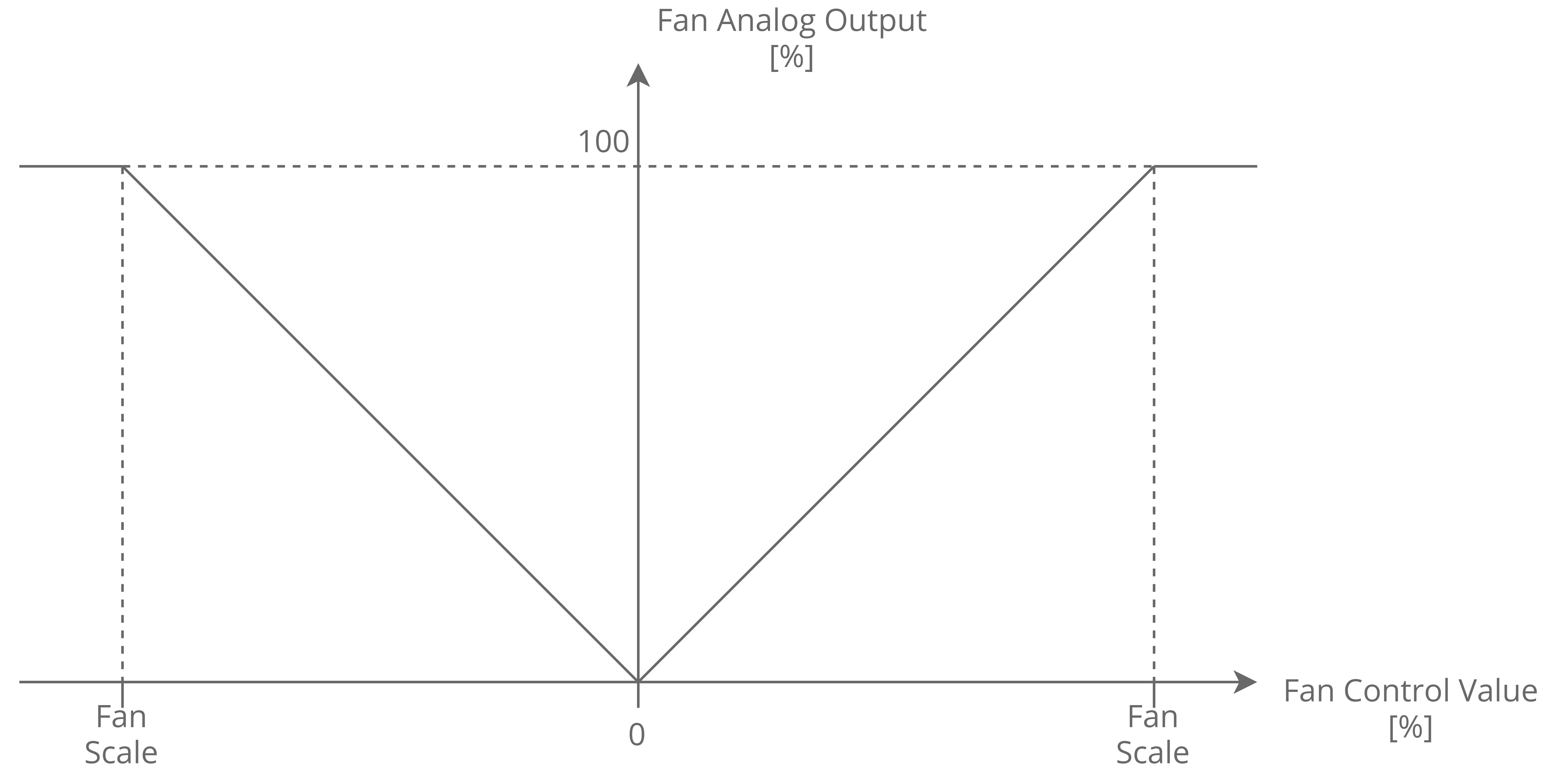
The way of calculating the fan control value
The Fan Control Value is used to calculate the current speed of the fan (for fans with binary inputs), or the value of the Fan Analog Out slot (for fans with analog input). The way of calculating both values is presented by the below figures:
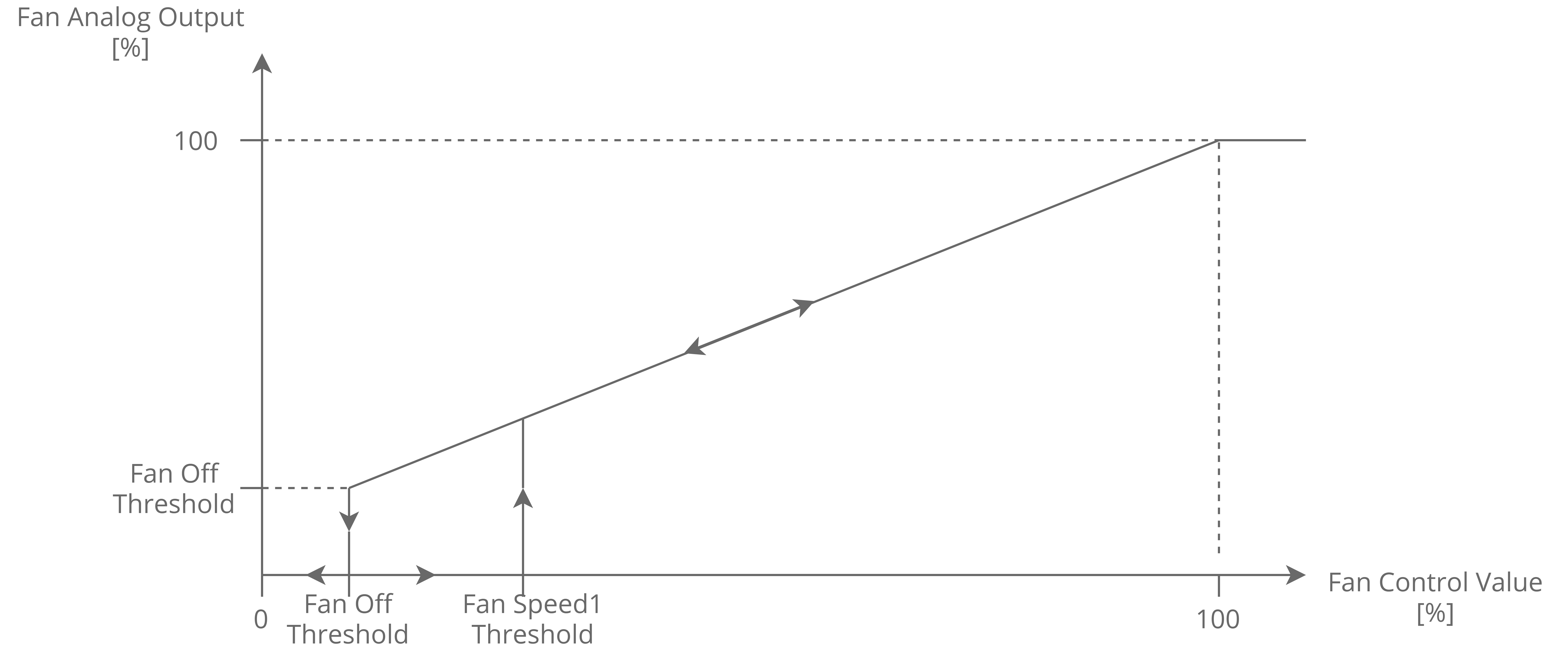
Control of fan with analog inputs in the auto mode
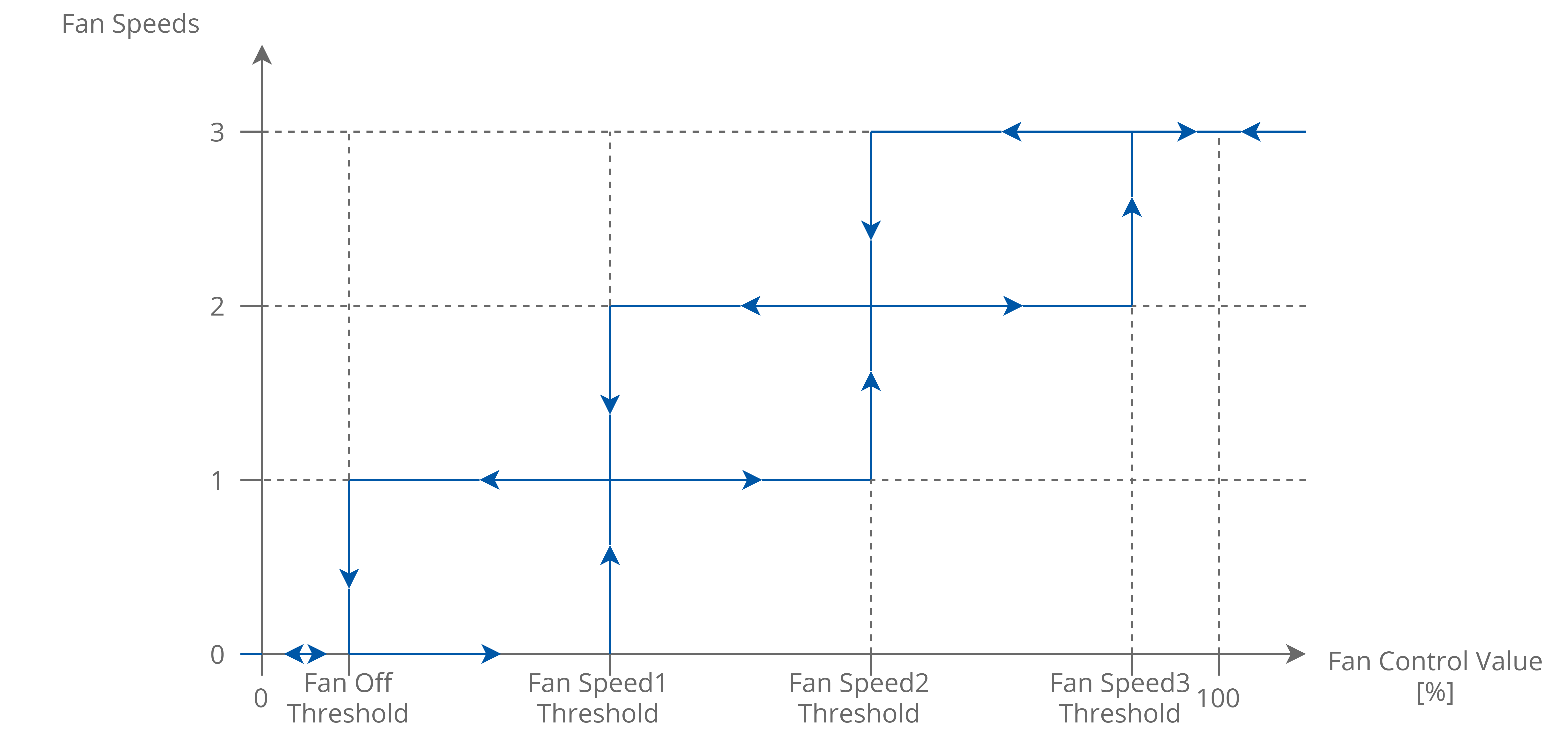
Control of fan with binary inputs in the auto mode
-
Heating Occupied Active: allows to enable or disable the function enforcing fan operation;Available settings: true (enabled), false (disabled);
Heating Occupied Active Enabled
If the fan works in the Auto mode (the Fan Mode slot is set to 4), the space is occupied (the Occupancy Status slot is set to 1), and the FCU_FanControl component works in the heating temperature mode (the Heating Cooling slot is set to true), the fan will always be switched on, even if the value of the Setpoint slot is lower than value of the Cv slot, in which case, according to the control algorithm, the fan should be switched off.
-
Cooling Occupied Active: allows to enable or disable the function enforcing fan operation;Available settings: true (enaled), false (disabled);
Cooling Occupied Active Enabled
If the fan works in the Auto mode (the Fan Mode slot is set to 4), the space is occupied (the Occupancy Status slot is set to 1), and the FCU_FanControl component works in the cooling temperature mode (the Heating Cooling slot is set to false), the fan will always be switched on, even if the value of the Setpoint slot is higher than the value of the Cv slot, in which case, according to the control algorithm, the fan should be switched off.
Note: The way of calculating the current speed of the fan (for fans with binary inputs) or value of Fan Analog Out slot (for the fan with analog input), when Cooling/Heating Occupied Active function is enabled, is presented in the figures below:
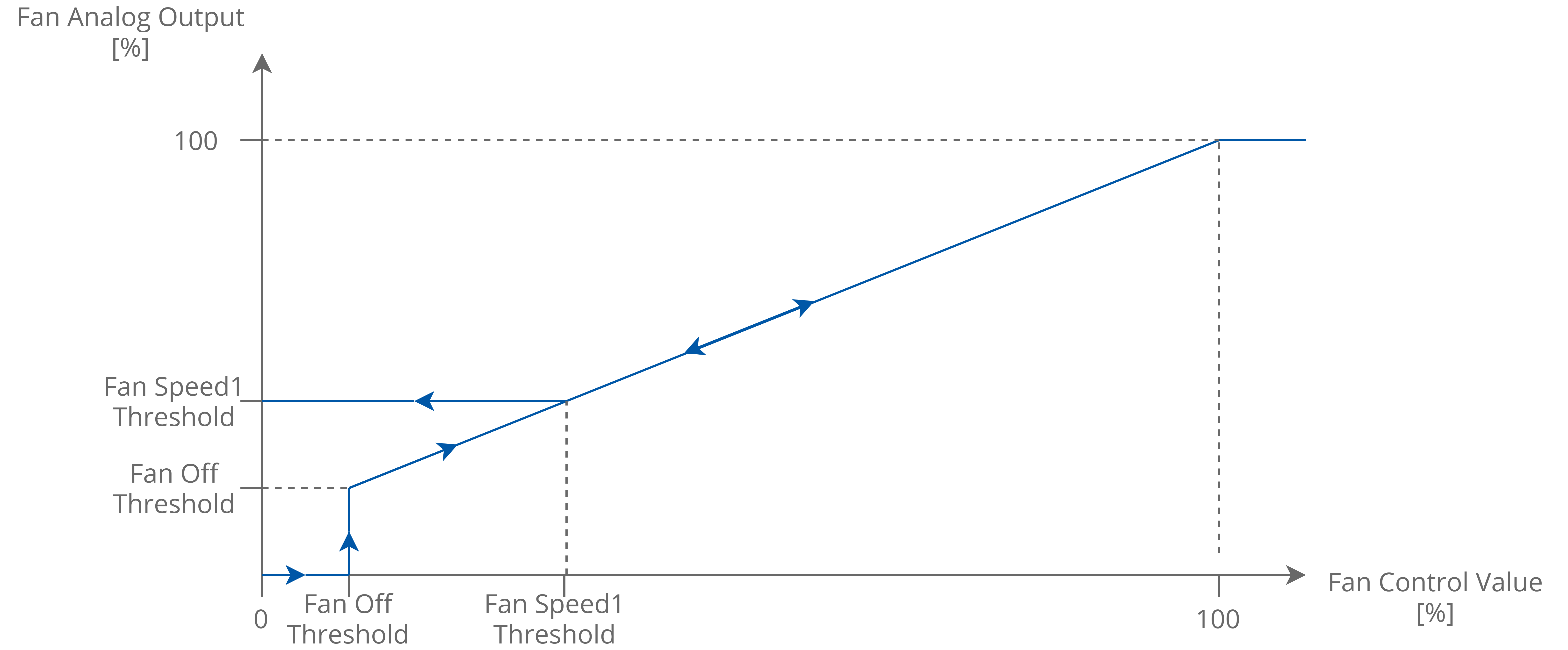
Heating/Cooling occupied active function for a fan with an analog input
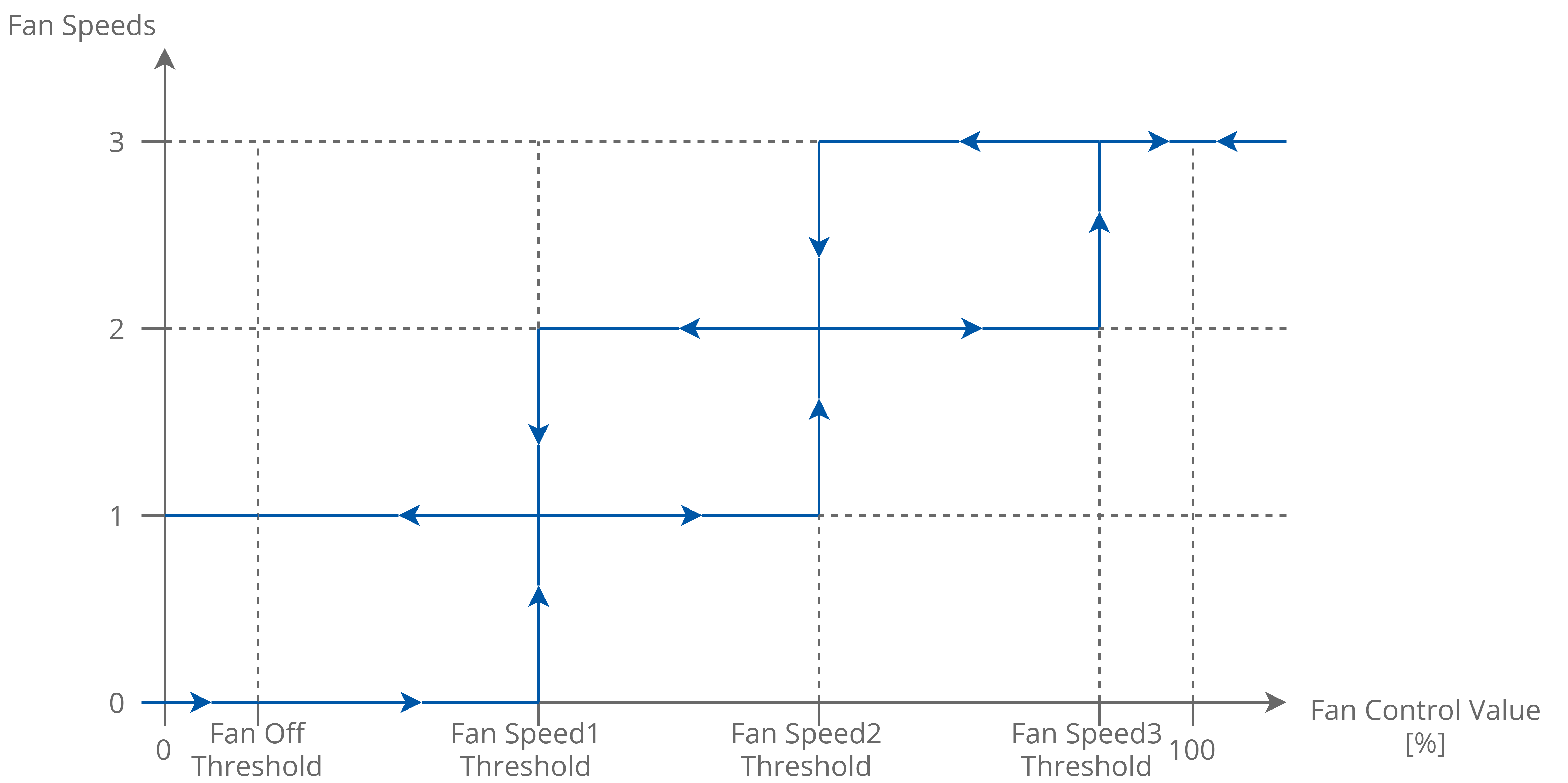
Heating/Cooling occupied active function for fans with binary inputs
-
Fan Delay Off: sets the value of the delay-off time, expressed in seconds; each time, the value of the Fan Status ID slot is higher than 0 and the fan should be switched off, it remains working for the time equal to the value of this slot; after this time, the fan will switch off. If the slot is set to 0, the function is disabled;
-
Soft Start Time: sets the time, in which the fan is working in the Soft Start mode, expressed in seconds. If the slot is set to 0, the function is disabled.
-
Soft Start Value: sets the value for the Soft Start mode, expressed as percentage.
Note: If the Soft Start Value is lower than the Fan Speed 1 Threshold, the value will be taken from the Fan Speed 1 Threshold slot.
Note: The Soft Start function is dedicated to fans with analog input. If the fan start with small control value ramp lasts too long or is impossible, overheating of the driver or motor can occur. In this function, the fan start output value will be increased to the Soft Star Value for the time defined in the Fan Soft Start Time. If the time of the soft start is finished, the Fan Analog Out slot is set to the current value calculated by the algorithm of the component.
